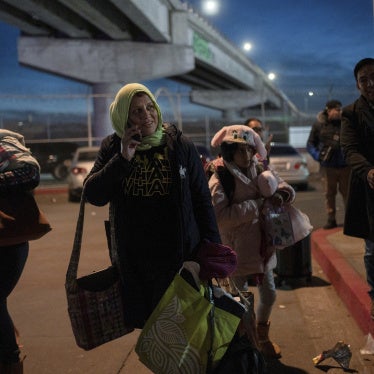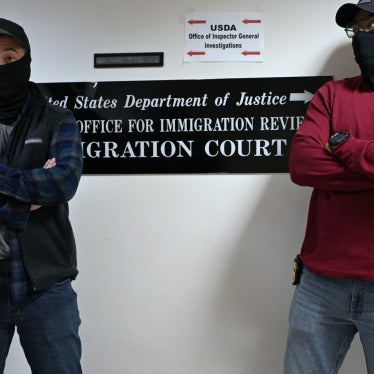Samantha Deshommes
Chief, Regulatory Coordination Division
Office of Policy and Strategy
US Citizenship and Immigration Services, Department of Homeland Security
20 Massachusetts Avenue NW
Washington, DC 20529-2140
Re: Comments in Response to Eligibility for Employment Authorization Based on a Pending Asylum Application, DHS Docket No. USCIS-2019-0011
To whom it may concern,
Human Rights Watch respectfully submits this comment to the Department of Homeland Security’s proposal in Docket No. USCIS-2019-0011, to extend the waiting period for asylum applicants to apply for an employment authorization document (EAD) from 180 days to 365 days from the date the asylum application is received by USCIS or the Department of Justice.
Human Rights Watch is a nonprofit, nongovernmental human rights organization. We operate in 90 countries and have been investigating, documenting, and exposing human rights abuses around the world for four decades. We have published numerous reports on the human rights of migrants and asylum seekers within the US immigration system. We have also previously documented the impact of delayed work authorization and denial of federal benefits for asylum seekers in the United States.
We urge that the proposed rule be rescinded because we regard the extension of the adjudication time as an unjustifiable barrier to individuals’ exercise of their human right to seek asylum in the United States, regardless of their financial circumstances or status.
The extension of the EAD adjudication period from 180 days to 365 days will make it difficult for applicants to pay the initial filing fee because they will have to wait significantly longer before they can legally work. Furthermore, applicants who go an entire year without the ability to legally work will face difficulty providing for themselves and their families as they wait for their applications to be adjudicated.
In previous research, Human Rights Watch found that the current 180-wait period has caused undue distress for asylum applicants as they wait for adjudication of their cases:[1]
Josiane F., a 27-year-old rape survivor from Rwanda, said that not being able to work “kills you emotionally. Just sitting on your own, one year, two years… doing nothing, just sitting there, kills you. I was so depressed.”
William K., an asylum seeker from the Democratic Republic of Congo (DRC), said that not being able to work and not having a lawyer “was really frustrating.” He said that it had a negative impact on his mental health. “I was not sleeping at night, had nightmares. You feel like you are lost, depression.”
Emanuel L., an asylum seeker from the DRC, said that being unable to work was “another form of persecution,” because “you’re nothing without a work permit.” Not having work authorization is “like punishment,” he said. “We feel discriminated [against].”
Thomas N., an asylum seeker from Cameroon, said, “I don’t feel like I have the same kind of respect” as others. “It’s demeaning.” Not having the ability to work makes you “[r]emember that you don’t belong here.”
Anastasia K., a Ukrainian asylum seeker, relies on her brother for food and shelter. “I want to be able to work,” said Anastasia. “I am a burden on my brother, but I have nowhere else to go.”
As these testimonies from asylum seekers show, the extension of this wait period will cause asylum seekers further psychological and financial harm and could cause such despondency and destitution that they will not be able to continue to seek asylum.
Human Rights Watch is concerned that applicants who are not authorized to work will be compelled to work illegally in order to meet their needs while their asylum claims are pending. This will place them at greater risk of arrest and of being exploited in the workplace. For example, Munyiga N., a child soldier from Uganda, seeking asylum in the United States, worked a number of manual-labor jobs without employment authorization. Working in such jobs “was really hard and very complicated.” Munyiga was paid only $3 an hour but noted that “[I] [couldn’t] say that they mistreat me” for fear of reprisal. One day, while working on a roof, Munyiga fell and hit the ground. He lay on the ground, unconscious for several minutes until someone called the police. But because Munyiga did not have work authorization, when he regained consciousness, his boss told him to run. Although Munyiga was the victim, his employer made him leave the scene so as not to implicate himself and his employer in illegal work activity. Munyiga asked, “What does that have to do with my being injured?... I couldn’t even go to the hospital because they wouldn’t look at me.” This experience made Munyiga realize that, without work authorization, “you are a piece of nothing; you are a nobody.”
We request that DHS halt the extension of the adjudication process. Please do not hesitate to contact us if you have questions regarding our comments. Thank you for your consideration.
Sincerely,
Bill Frelick
Director, Refugee Rights Program
Human Rights Watch
[1] Human Rights Watch, “At Least Let Them Work”: The Denial of Work Authorization and Assistance for Asylum Seekers in the United States (New York: Human rights Watch, 2013), https://www.hrw.org/report/2013/11/12/least-let-them-work/denial-work-authorization-and-assistance-asylum-seekers-united.








